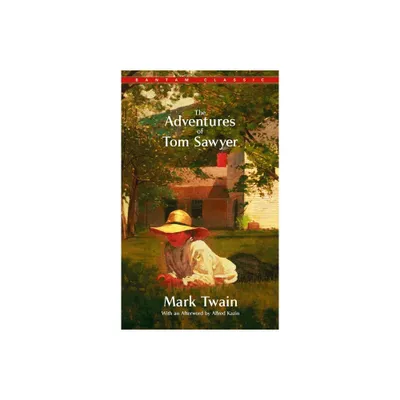Home
The Adventures of Tom Sawyer / Edition 2
Loading Inventory...
Barnes and Noble
The Adventures of Tom Sawyer / Edition 2
Current price: $16.95


Barnes and Noble
The Adventures of Tom Sawyer / Edition 2
Current price: $16.95
Loading Inventory...
Size: OS
*Product Information may vary - to confirm product availability, pricing, and additional information please contact Barnes and Noble
Mischief is Tom Sawyer's middle name. There is nothing he likes better than playing hookey from school, messing about on the Mississippi with his best friend, the hobo Huckleberry Finn, or wooing the elusive beauty Becky Thatcher. Lazy and reckless, he is a menace to his Aunt Polly - 'Tom, I've a notion to skin you alive' - an embarrassment to his teachers and the envy of his peers. But there is method in his badness. He exhibits all the cunning of a magpie when hatching an elaborate scheme to avoid whitewashing a fence, and an adventure downriver with Huck and Joe Harper plunges the little town of St Petersburg into such an outpouring of grief that Tom is spared the belt on his return. But the innocent adventures end suddenly when Tom and Huck witness a murder in the graveyard. Should they tell of what they saw under the moonlight, when Injun Joe slipped the bloodstained knife into the hands of Muff Potter? Or should they 'keep mum' and risk letting an innocent man go to the gallows?
'Most of the adventures recorded in this book really occurred; one or two were experiences of my own, the rest of those boys who were schoolmates of mine', Mark Twain wrote in the preface to the original 1876 edition. Inspired by his upbringing in a small township on the Mississippi, and written 'to remind adults of what they once were themselves, and of how they felt and thought and talked, and what queer enterprises they sometimes engaged in', Twain's hymn to childhood and the great outdoors remains a classic account of boys on the loose in frontier-era America.
'Most of the adventures recorded in this book really occurred; one or two were experiences of my own, the rest of those boys who were schoolmates of mine', Mark Twain wrote in the preface to the original 1876 edition. Inspired by his upbringing in a small township on the Mississippi, and written 'to remind adults of what they once were themselves, and of how they felt and thought and talked, and what queer enterprises they sometimes engaged in', Twain's hymn to childhood and the great outdoors remains a classic account of boys on the loose in frontier-era America.


















